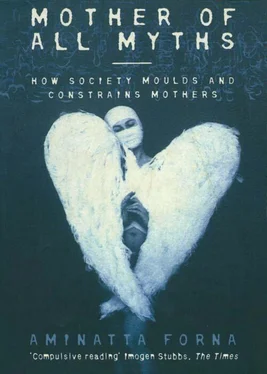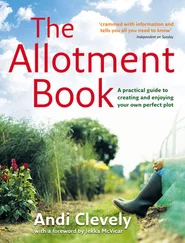1 ...8 9 10 12 13 14 ...18 From that day to this, advice to mothers and mothers-to-be has proliferated, but the warning tone remains the same from Donald Winnicott in the 1950s to Penelope Leach in the 1980s. Indeed, many of the same old chestnuts – for example, putting pressure on women to breastfeed, the idea that unborn children react to their mothers’ emotions, or that motherhood is women’s true calling above and beyond other roles – appear time and time again.
So, in brief, that is how motherhood came to be as it is today: one of the most natural human states and yet one of the most policed; the sole responsibility of women; not simply a duty but a highly idealized calling surrounded by sentiment. Matters were bad enough for Victorian mothers, but they were set to become even worse during the twentieth century as science, psychology, politics and debates surrounding gender pushed the motherhood myth to its limits and beyond.
Viewing motherhood through the lens of time reveals details that are lost up close. Let’s take the current debate over whether it is psychologically damaging for children to be placed in daycare, specifically the idea that work and good mothering are incompatible. During the Industrial Revolution changes to the system of work meant that women could not work outside the home easily as well as being responsible for family life within it. After the Second World War, when the government needed women to give up the jobs they had held during the war period for the men returning from fighting, it was said that women should not combine work and motherhood; the justification for that, as we shall see, was provided by psychologists in the second half of the twentieth century who claimed (and continue to claim) that children are damaged by their mothers’ absence, even for a few hours, at work.
Rousseau, who incidentally put five of his own children into foundling homes, thought that caring for children was solely the job of women and blamed them alone for the plight of eighteenth-century French children. He argued that education and ambition distracted women from their basic function. So did the Victorians. Today, the legacy of those ideas continues to be reflected in attitudes to ‘career women’ who choose not to have children and mothers who work.
An historical perspective makes us redefine our most basic assumptions about human nature and motherhood. What seems ‘natural’ in one period appears unnatural in another. We would never want to return to treating children as they were treated in the eighteenth century, but it is interesting to speculate how those mothers who had so little time for or interest in their offspring, and who regarded breastfeeding as unpleasant and motherhood an unavoidable bore, would view the Victorian woman to whom motherhood was (expected to be) everything? Elizabeth Badinter remarks:
Mother love has been discussed as a kind of instinct for so long that a ‘maternal instinct’ has come to seem rooted in women’s very nature, regardless of the time or place in which she has lived. In the common view, every woman fulfills her destiny once she becomes a mother, finding within herself all the required responses, as if they were automatic and inevitable, held in reserve to await the right moment. 23
After her Odyssey into motherhood in times past, Badinter casts doubt on the notion of any kind of universal, predictable and long-term ‘maternal instinct’ at all. Indeed, the term has now fallen out of use among professionals, be they psychologists or scientists, but presumptions about the biological make-up of women are nevertheless central to the discussions about how women carry out the duties of motherhood and what those duties actually are. A popular view of maternal behaviour includes a woman’s sole responsibility for an infant right through to adulthood, and that is an idea that historical evidence simply does not sustain.
In the past many people knew, or thought they knew, why they had children. It may have been because they could not prevent conception, or because they needed extra hands to work the looms, or to care for them when they grew old, or because they had been instructed to ‘go forth and multiply’. Nowadays those reasons appear redundant. In the context of modern times, children are as likely to be the product of our emotions – desire. passion, altruism, selfishness, love, boredom and vanity – as much as any deeply-rooted, biologically-impelled compulsion. Fuelling the modern obsession with motherhood are our efforts to construct a new rationale for it. Until we find one that is complex and subtle enough to satisfy us, we will continue to build myths around motherhood.
The final lesson of history, on which this chapter must conclude, is that mothering has varied over time. The style of mothering which we have inherited today, with its roots in the nuclear family, was fashioned in a particular way at a specific time in history out of necessity and expediency. The separate elements consist variously of genuine concern at the abandonment of children, a less wholesome view of the nature and the place of women (and of men) and a specific economic context. By coincidence and by design these elements intertwined to produce what we now think of as ‘traditional’ motherhood. The emphasis on romantic motherhood in the Victorian era would eventually give way to the new century and suffragist demands for the vote and women’s liberation. For women, that sense of freedom would prove short-lived with the massive revitalization of the motherhood myth as the twentieth century moved forwards.
chapter 3 Pygmalion Mother: The Making of the Modern Myth
Testimony: Barbara
Barbara is forty-one years old, married, with two sons. A trained lawyer, she currently works for a charitable trust.
My mother stayed home with us, me and my two brothers – one a year and a half younger, one five years younger. My mother was always at home with us. Once I got into secondary school she began to do some volunteer work and she was always involved in activities in our school. My father was a surgeon and not at home very much. He was very involved in his practice, so my mother was pretty much on her own in terms of looking after us. She came from a big Catholic family, six brothers and six sisters. Her sisters would help out. Three sisters lived nearby, as well as her sisters-in-law who were happy and willing to help out from time to time. Other than that, I don’t even remember her employing a cleaner to do the housework. She did it all herself.
I can’t remember a single one of her friends who worked at that time. There were two women who had law degrees and didn’t practise. I remember being so impressed that they had these degrees, but I wasn’t surprised that they didn’t work because they were mothers, and mothers stayed home. My father would not let my mother work. That’s the way she put it. He just said no.
I never really gave children or motherhood much thought. I didn’t have much empathy for the few women that I knew who had children before I did. I didn’t have a sense of how overwhelming the responsibility and the time commitment would be. In recent years I’ve regretted that I didn’t provide more support to my friends who had children. But I didn’t get it. I didn’t realize what a great thing it would have been for me to say, ‘I’ll take the kids for a day,’ which I easily could have done, but I didn’t. I just didn’t get it. I would go and visit them, but I never suggested doing anything.
With my own kids, I planned to hire someone to come in, but then I decided I couldn’t trust anyone. I couldn’t monitor them. I was very protective. First I put him into daycare and I went back to work at five and a half months. Then I took him away from there, because I didn’t think the woman was giving him the kind of stimulation I wanted him to have. So I put him in another daycare situation. Then when I had my second son I stopped working and stayed at home for two and a half years. Any help I had I got through agencies, or they were contacts through friends.
Читать дальше












